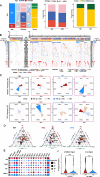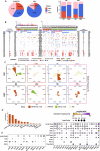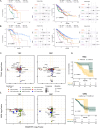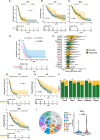Age- and ethnic-driven molecular and clinical disparity of East Asian breast cancers
- PMID: 39334392
- PMCID: PMC11438198
- DOI: 10.1186/s12916-024-03638-y
Age- and ethnic-driven molecular and clinical disparity of East Asian breast cancers
Abstract
Background: Breast cancer (BC) is a complex disease with profound genomic aberrations. However, the underlying molecular disparity influenced by age and ethnicity remains elusive.
Methods: In this study, we aimed to investigate the molecular properties of 843 primary and metastatic BC patients enrolled in the K-MASTER program. By categorizing patients into two distinct age subgroups, we explored their unique molecular properties. Additionally, we leveraged large-scale genomic data from the TCGA and MSK-IMPACT studies to examine the ethnic-driven molecular and clinical disparities.
Results: We observed a high prevalence of PI3KCA mutations in K-MASTER HER2 + tumors, particularly in older patients. Moreover, we identified increased mutation rates in DNA damage response molecules, including ARID1A, MSH6, and MLH1. The K-MASTER patients were mainly comprised of triple-negative breast cancer (TNBC) and HER2-positive tumors, while the TCGA and MSK-IMPACT cohorts exhibited a predominance of hormone receptor-positive (HR +) subtype tumors. Importantly, GATA3 mutations were less frequently observed in East Asian patients, which correlated with poor clinical outcomes. In addition to characterizing the molecular disparities, we developed a gradient-boosting multivariable model to identify a new molecular signature that could predict the therapeutic response to platinum-based chemotherapy.
Conclusions: Our findings collectively provide unprecedented insights into the significance of age and ethnicity on the molecular and clinical characteristics of BC patients.
Keywords: Breast cancer; Ethnic diversity; Genomic alterations; Molecular subtypes; Precision medicine.
© 2024. The Author(s).
Conflict of interest statement
The authors declare no competing interests.
Figures




References
Publication types
MeSH terms
Substances
Grants and funding
LinkOut - more resources
Full Text Sources
Medical
Research Materials
Miscellaneous

